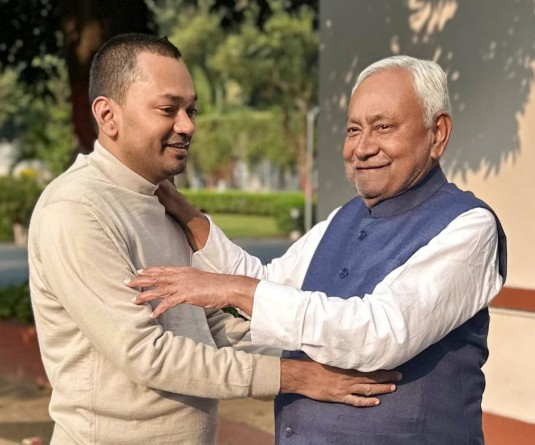
A sales person stands in his shop as a TV news reports the killing of Osama bin Laden in Mumbai, May 2. Osama bin Laden, the mastermind behind the Sept. 11, 2001, terror attacks that killed thousands of people, was slain in his luxury hideout in Pakistan early Monday in a firefight with U.S. forces, ending a manhunt that spanned a frustrating decade. (AP Photo)
New Delhi, May 2 (Agencies): New Delhi reacted to Osama bin Laden’s killing by terming it the “end of the Fourth Afghan War” and hoping the end of operations against the Al Qaida leader ``deep inside Pakistan’’ would now compel Islamabad to effectively prosecute those involved in the Mumbai terror attacks of late 2008. But there was little exultation over bin Laden’s death as top officials in South Block attempted to work out its implications on Indian foreign policy. ``It was [a] great operation…proves what we thought…now we have to await the consequences,’’ said high level sources.
By consequences, they meant whether this would be the watershed moment for U.S. President Barack Obama to put plans for withdrawal of foreign troops from Afghanistan in high gear. They also hoped that Pakistan would be suitably chastised and embarrassed by the end of the biggest man hunt in recent world history right at the edges of their national capital to end its policy of keeping militant networks alive as an insurance policy.
“A watershed moment”
Another top official pointed out that bin Laden’s death could be a watershed moment in the struggle against the variety of militant Islam that propagates a unified world-wide Muslim nation. “But the struggle hasn’t ended though this was a development the world was waiting for,” cautioned the official. For the record, External Affairs Minister S. M. Krishna and Union Home Minister P. Chidambaram drew attention to US claims that bin Laden had been sheltered in a compound near Islamabad and made the point about continuance of safe sanctuaries in Pakistan which led militants to intermittently derail bilateral ties with India through deadly attacks targeting soft targets in bazaars, mass transportation utilities and hotels.
“The world must not let down its united effort to overcome terrorism and eliminate the safe havens and sanctuaries that have been provided to terrorists in our own neighbourhood,” observed Mr. Krishna. He also noted that the operation to eliminate the Al Qaida operation took place ``deep inside Pakistan’’, meaning Islamabad would have a hard time explaining how a person being targeted by the world community for a decade was living in an area that, unlike the Federally Administered Tribal Areas (FATA), is totally under the control of the Pakistan’s security and other administrative organs.
Chidambaram expanded on the location of bin Laden’s killing to highlight the Indian security apparatus’ “concern that terrorists belonging to different organisations find sanctuary in Pakistan” as also to urge civilian Government in Islamabad to deliver on Indian demands for prosecuting those accused for the Mumbai attacks. “We once again call upon the Government of Pakistan to arrest the persons whose names have been handed over to the Interior Minister of Pakistan as well as provide voice samples of certain persons who are suspected to be among the controllers and handlers of the terrorists,” the Minister said in a statement. Pakistan has arrested seven for plotting the Mumbai terror attacks while 20 have been declared proclaimed offenders.
By consequences, they meant whether this would be the watershed moment for U.S. President Barack Obama to put plans for withdrawal of foreign troops from Afghanistan in high gear. They also hoped that Pakistan would be suitably chastised and embarrassed by the end of the biggest man hunt in recent world history right at the edges of their national capital to end its policy of keeping militant networks alive as an insurance policy.
“A watershed moment”
Another top official pointed out that bin Laden’s death could be a watershed moment in the struggle against the variety of militant Islam that propagates a unified world-wide Muslim nation. “But the struggle hasn’t ended though this was a development the world was waiting for,” cautioned the official. For the record, External Affairs Minister S. M. Krishna and Union Home Minister P. Chidambaram drew attention to US claims that bin Laden had been sheltered in a compound near Islamabad and made the point about continuance of safe sanctuaries in Pakistan which led militants to intermittently derail bilateral ties with India through deadly attacks targeting soft targets in bazaars, mass transportation utilities and hotels.
“The world must not let down its united effort to overcome terrorism and eliminate the safe havens and sanctuaries that have been provided to terrorists in our own neighbourhood,” observed Mr. Krishna. He also noted that the operation to eliminate the Al Qaida operation took place ``deep inside Pakistan’’, meaning Islamabad would have a hard time explaining how a person being targeted by the world community for a decade was living in an area that, unlike the Federally Administered Tribal Areas (FATA), is totally under the control of the Pakistan’s security and other administrative organs.
Chidambaram expanded on the location of bin Laden’s killing to highlight the Indian security apparatus’ “concern that terrorists belonging to different organisations find sanctuary in Pakistan” as also to urge civilian Government in Islamabad to deliver on Indian demands for prosecuting those accused for the Mumbai attacks. “We once again call upon the Government of Pakistan to arrest the persons whose names have been handed over to the Interior Minister of Pakistan as well as provide voice samples of certain persons who are suspected to be among the controllers and handlers of the terrorists,” the Minister said in a statement. Pakistan has arrested seven for plotting the Mumbai terror attacks while 20 have been declared proclaimed offenders.
Pak continue to shelter terrorists: PC
New Delhi, May 2 (PTI): India today said the killing of global terrorist Osama bin Laden was a matter of grave concern as it proved that terrorists belonging to different groups find sanctuary in Pakistan. Union Home Minister P Chidambaram said in a statement that perpetrators of the Mumbai terror attacks, including the controllers and handlers of the terrorists, continue to be sheltered in Pakistan. He said that earlier today the U.S. government informed New Delhi that Osama bin Laden had been killed by security forces somewhere “deep inside Pakistan.”
“After the September 11, 2001 terror attack, the U.S. had a reason to seek Osama bin Laden and bring him and his accomplices to justice,” the statement said. “We take note with grave concern that part of the statement in which President (Barack) Obama said that the fire fight in which Osama bin Laden was killed took place in Abbotabad ‘deep inside Pakistan’. “This fact underlines our concern that terrorists belonging to different organisations find sanctuary in Pakistan,” he said. The Home Minister said in the wake of this incident “we believe that perpetrators of the Mumbai terror attacks, including the controllers and handlers of the terrorists who actually carried out the attack, continue to be sheltered in Pakistan. “We once again call upon the Government of Pakistan to arrest the persons whose names have been handed over to the Interior Minister of Pakistan as well as provide voice samples of certain persons who are suspected to be among the controllers and handlers of the terrorists.”
New Delhi, May 2 (PTI): India today said the killing of global terrorist Osama bin Laden was a matter of grave concern as it proved that terrorists belonging to different groups find sanctuary in Pakistan. Union Home Minister P Chidambaram said in a statement that perpetrators of the Mumbai terror attacks, including the controllers and handlers of the terrorists, continue to be sheltered in Pakistan. He said that earlier today the U.S. government informed New Delhi that Osama bin Laden had been killed by security forces somewhere “deep inside Pakistan.”
“After the September 11, 2001 terror attack, the U.S. had a reason to seek Osama bin Laden and bring him and his accomplices to justice,” the statement said. “We take note with grave concern that part of the statement in which President (Barack) Obama said that the fire fight in which Osama bin Laden was killed took place in Abbotabad ‘deep inside Pakistan’. “This fact underlines our concern that terrorists belonging to different organisations find sanctuary in Pakistan,” he said. The Home Minister said in the wake of this incident “we believe that perpetrators of the Mumbai terror attacks, including the controllers and handlers of the terrorists who actually carried out the attack, continue to be sheltered in Pakistan. “We once again call upon the Government of Pakistan to arrest the persons whose names have been handed over to the Interior Minister of Pakistan as well as provide voice samples of certain persons who are suspected to be among the controllers and handlers of the terrorists.”
High alert on Indo-Pak border
AMRITSAR, May 2 (Agencies): Border Security Force (BSF) has been put on high alert along the 553 kilometer international border with Pakistan in Punjab following the killing of al-Qaida chief Osama bin Laden by the US troops in Pakistan. Security has also been tightened at all the three ports of city including Sri Guru Ramdas International Airport, Attari International Railway station and Attari land border. Immigration officials have taken adequate security measures including passenger-profiling especially those arriving from Pakistan. The measure intends to thwart attempts of Pak based terror organizations to send terrorists disguised as tourists or businessmen into India.
“We have increased the manpower and have asked the officers to move to border and guide the troops on possible threat from across the border,” said BSF Inspector General, Frontier, Himmat Singh while talking to TOI on Monday. “There have been rocket attacks from Pakistan. So we have to be on a high vigil,” said Himmat Singh. Indian villages in Punjab have been on the target list of Pak based terrorists. They have come under rocket attacks at least four time since July 2009. The Pakistani attack on Punjab borders in 2009 was the first since Indo Pak partition in 1947. And for the first time, in retaliation to rocket attacks, BSF had opened machine gun and mortar fire targeting Pakistan’s KS Wala Border Outpost.
Himmat Singh said that there was possibility of some spill over effect of Pakistani terrorist’s frustration who could launch another round of rocket attacks. “It is wise to be on alert,” he said. The border districts of Punjab including Amritsar, Tarn Taran , Gurdaspur and Ferozpur are high risk areas due to Pak Taliban’s presence close to international border. Police commissioner PPS Sidhu informed that police force have also been put on high alert and have been instructed to keep strict vigil in the border areas.
AMRITSAR, May 2 (Agencies): Border Security Force (BSF) has been put on high alert along the 553 kilometer international border with Pakistan in Punjab following the killing of al-Qaida chief Osama bin Laden by the US troops in Pakistan. Security has also been tightened at all the three ports of city including Sri Guru Ramdas International Airport, Attari International Railway station and Attari land border. Immigration officials have taken adequate security measures including passenger-profiling especially those arriving from Pakistan. The measure intends to thwart attempts of Pak based terror organizations to send terrorists disguised as tourists or businessmen into India.
“We have increased the manpower and have asked the officers to move to border and guide the troops on possible threat from across the border,” said BSF Inspector General, Frontier, Himmat Singh while talking to TOI on Monday. “There have been rocket attacks from Pakistan. So we have to be on a high vigil,” said Himmat Singh. Indian villages in Punjab have been on the target list of Pak based terrorists. They have come under rocket attacks at least four time since July 2009. The Pakistani attack on Punjab borders in 2009 was the first since Indo Pak partition in 1947. And for the first time, in retaliation to rocket attacks, BSF had opened machine gun and mortar fire targeting Pakistan’s KS Wala Border Outpost.
Himmat Singh said that there was possibility of some spill over effect of Pakistani terrorist’s frustration who could launch another round of rocket attacks. “It is wise to be on alert,” he said. The border districts of Punjab including Amritsar, Tarn Taran , Gurdaspur and Ferozpur are high risk areas due to Pak Taliban’s presence close to international border. Police commissioner PPS Sidhu informed that police force have also been put on high alert and have been instructed to keep strict vigil in the border areas.






